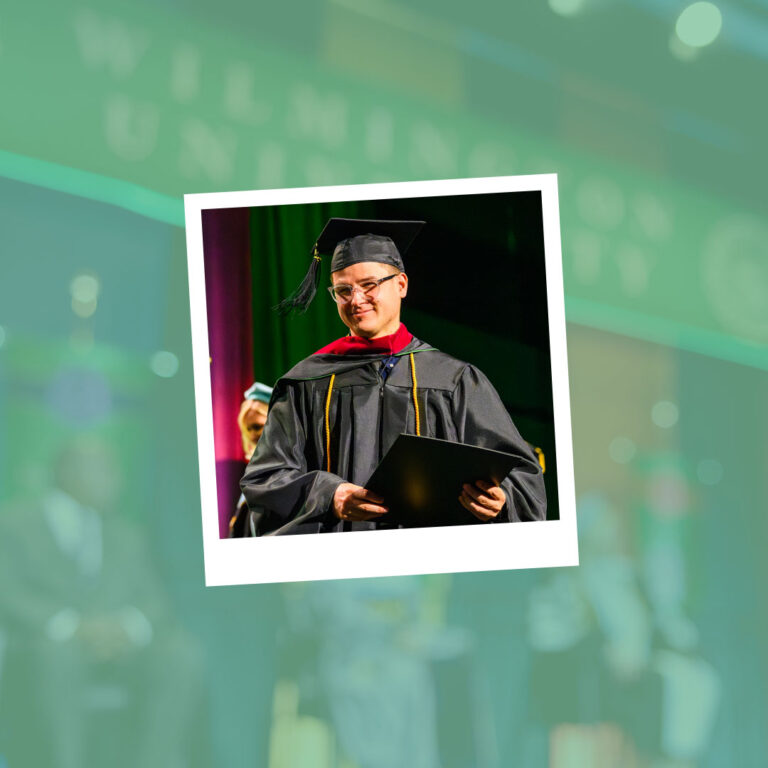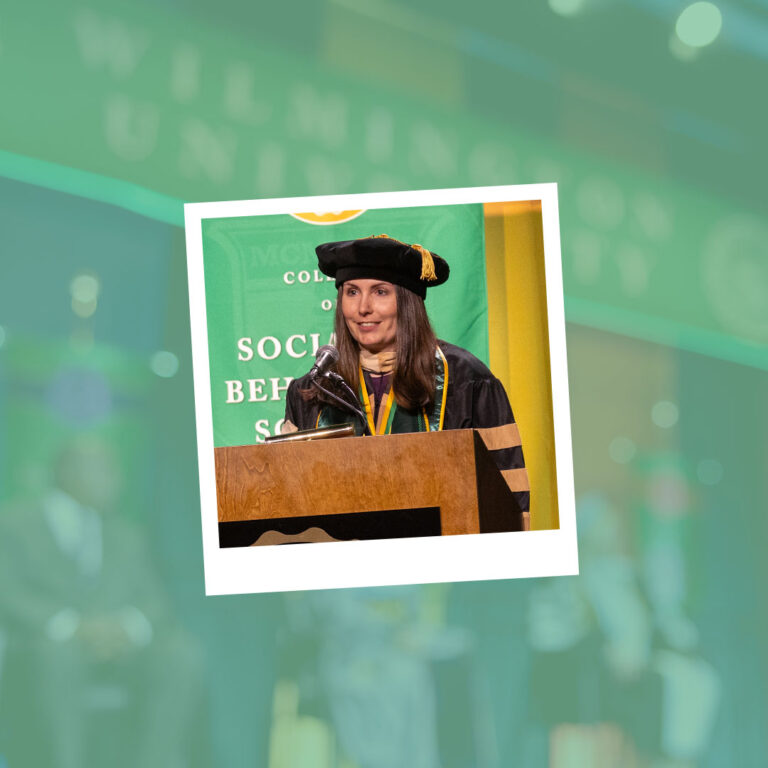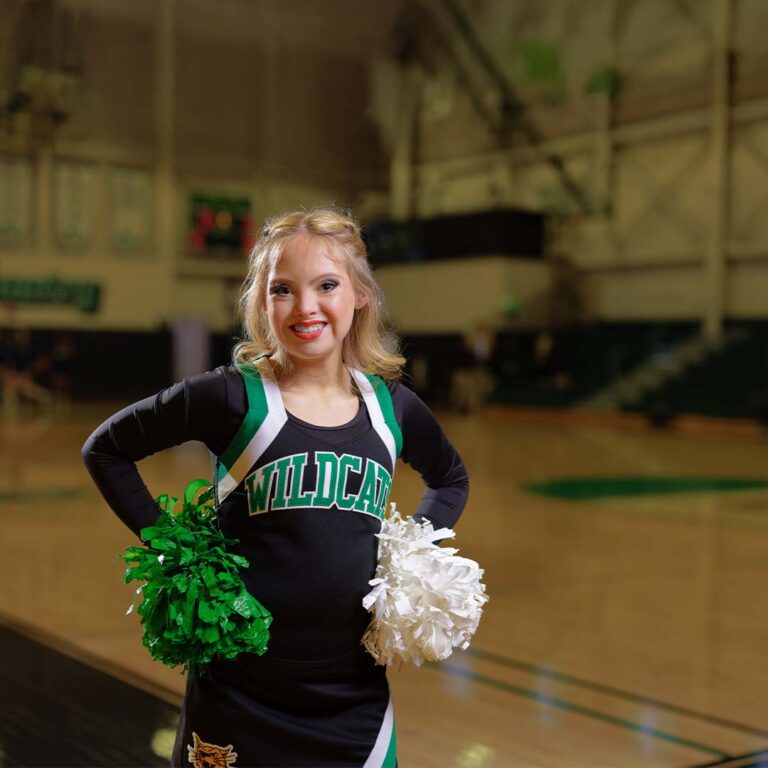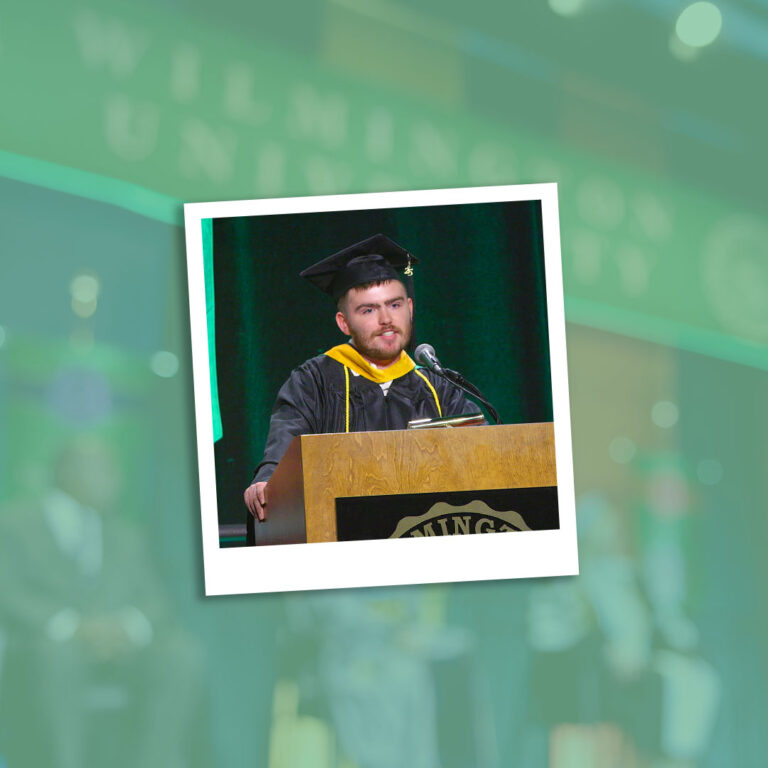Masters of Education
How five students turned homework into WilmU’s newest graduate degree Masters of Education

Heather Horowitz, Dr. Nina Buchanan, Dr. John Gray, Christina Asroff, Pamela McGee
Learning by doing is key to any educational experience. For five doctoral candidates in Wilmington University’s College of Education, the learning by doing involved in a recent class project sparked the creation of the university’s latest graduate degree.
The Master of Education in Higher Education program, the first degree of its kind in Delaware, is also the first WilmU degree to be developed, start to finish, by WilmU students, says assistant professor Dr. Nina Buchanan.
“If you look at WilmU’s mission, our courses are supposed to be practical and career-focused,” says Dr. Buchanan, who chairs the Doctor of Education in Higher Education Leadership program in which the students enrolled. “What could be better than applying their coursework to an actual project? I can’t think of a better way to get students engaged in the process.”
Teaching How to Teach
The M.Ed. in Higher Education, scheduled to launch at WilmU Brandywine and online this fall was designed to offer a type of training that’s often overlooked by university education departments: how to teach and manage at the college level.
It’s important training, not just for those seeking career advancement in higher education, but also for the rising tide of industry professionals who become course instructors in their areas of expertise without the benefit of previous academic experience.
“You see it all the time, brilliant people with advanced degrees in many fields who’ve never taken a course on how to teach,” says Marietta Dantonio-Madsen, one of the doctoral students who created the degree and an associate professor and Humanities chair at Cheyney University of Pennsylvania. “I fear we’re doing a disservice to college students if we don’t offer these new instructors the opportunity to learn the best methods and processes for teaching and evaluation.”

That opportunity necessitates a unique course of study — one that hadn’t been available at WilmU or elsewhere in the region, the students found — since teaching college students requires a different skill set than teaching in elementary or secondary schools does. “The way we teach is different, the environment is different, and the expectations are different,” says doctoral student Pamela McGee, an assistant clinical professor in Drexel University’s College of Nursing and Health Professions in Philadelphia. “The master’s in Higher Education is very different from a master’s in K-to-12 education.”
Developing an M.Ed. in Higher Education had been on the College of Education’s to-do list for a number of years. It was one of the curriculum revision tasks suggested to Dr. Buchanan upon her arrival at WilmU in October 2016. And it became a ready-made opportunity as she prepared to teach her Curriculum Leadership in Higher Education course (EDD 7108) during a seven-week block in Fall 2017.
While the course’s original lesson plan called for Dr. Buchanan’s five doctoral students to assess the effectiveness of an existing course, she decided instead to ask them to outline a proposal for a master’s in Higher Education, from which she and her colleagues could build a degree program.
“Curriculum creation is very siloed,” she says, “and I don’t like to work in silos. Since this was a small group, and they’d been studying together for two years, it was a great opportunity for them and for me. I thought, ‘I’ll bet it’ll be a lot different than anything I can come up with.’”

She had some ideas and a framework for the proposed course but otherwise left them with the latitude to innovate. “That was totally a curveball,” says McGee. “I’d worked with curriculum committees before, but I’d not been in charge of the product. At first, it looked like a lot of work — which we were not getting paid to do — but the further along we got, the more it became a really good creative process.”
Applying Their Abilities
The five students brought five different perspectives, informed by their diverse professional backgrounds, to the project. “It was like having an all-star team,” says Heather Horowitz, who directs student engagement and new student programs for Arcadia University in Glenside, Pennsylvania. “Everyone had a huge piece of the puzzle, so we could divide and conquer with what we brought to
the table.”
In fact, the students’ range of experiences in higher education inspired their decision to build the proposed master’s degree out of four related certificate programs, which they’d also sketch out. “We each took our own specialties and baked them in,” says Dr. Bryan Steinberg. “Each certificate is one of our skills.”

As the former senior director of WilmU’s Information Services department, Steinberg led the management-, budgeting-, human-resources- and decision-making-focused Administration in Higher Education certificate. “I live on the administrative side, so out of all the members of our cohort, I probably learned the most about developing a curriculum.”
Dantonio-Madsen and McGee,both seasoned college-level educators drafted the Teaching in Higher Education certificate, which covers best practices for conveying information, utilizing technology and measuring outcomes.
Horowitz channeled her student management experience into the Student Affairs in Higher Education certificate, which highlights learning assessment and legal issues. And Christina Asroff, a media technologist in the Educational Technology department of WilmU’s College of Experiential and Online Learning, compiled the Foundations of Higher Education certificate’s overview of the past and present of the academic environment.
“Once we planned the certificates, they were a road map to the master’s,” says McGee. The Foundations certificate makes up the core of the degree. Earning either the Administration, Student Affairs, or Teaching certificate denotes the degree’s specialized concentration. The program concludes with a capstone project. Each of the five-course certificates can also be earned as a standalone credential.
Creating the certificate programs and the degree they support involved the selection of WilmU courses that fulfilled the objectives of the master’s degree, the writing of course descriptions for those that didn’t yet exist, the planning of faculty hires and an institutional introduction for the degree program, among other team efforts.
“It was like Lego bricks,” says Dr. Steinberg. “We’re stacking and stacking and then, all of a sudden, we’ve got a building here. The learning we got from this project was beyond anything in a classroom, and it turned into something real.”
From Proposal to Program
“Around week five or six of the course, I knew they were on to something,” says Dr. Buchanan. “I gave them autonomy, and they gave me results that surpassed what I’d expected.”
As the students completed the master’s degree proposal and their curriculum leadership course in Fall of 2017, Dr. Buchanan suggested they present their project before College of Education Dean Dr. John Gray and Dr. Kathi Brown, the college’s director of Advanced Programs.

Their response was enthusiastic. “It was exciting to see the students recognize what others might need and how they might benefit from the program,” says Dr. Brown. “I remember their energy and their active engagement in the process — those are essential ingredients for the growth of any new idea — and I loved that they were open to all kinds of feedback; that they were willing to think and explore creatively, and yet with a real purpose.”
“I think we went beyond what was expected of us, which is why Nina brought our proposal to Dr. Gray and Dr. Brown,” says Asroff. “They could see we were serious about what we created — they were blown away by how serious we were. Dr. Gray believes highly in experiential projects like this one. This fit his model for what learning should be like.”
Adds McGee, “Dr. Gray told us he’d been trying for a long time to get the faculty to agree on the content for a master’s in Higher Education. What we did in seven weeks, he said, they couldn’t do in more than a decade.”
Drs. Gray and Brown encouraged the students to keep working on the proposal, in particular exploring the demand for and fiscal viability of the degree program. The extracurricular efforts earned them the practical experience hours their doctorates required.
As WilmU employees, Steinberg and Asroff had access to the University’s market research data to determine industry trends and tapped University administrators for their insights on development and budgeting. Chief Financial Officer Heather O’Connell and Controller David Lewis of the Financial Affairs Department were especially informative, they note, on the inner workings of program funding at WilmU.
By the end of the Spring 2018 semester, they’d presented their proposal to WilmU’s Academic Council — a roundtable of all the college deans that reviews curriculum matters — which in turn recommended it to President Dr. LaVerne Harmon and her executive team. The M.Ed. in Higher Education received final approval from the Faculty Senate in December of 2018.
“My first impression of the students’ work was very positive, as the initial proposal had good research to support the concept,” says Dr. Jim Wilson, vice president for Academic Affairs. “Right from the start, I saw this particular program and the related certificates as a needed area of study for our students. The students designing this degree have had an amazing experience.”
Education in Practice
“I’m thrilled, I’m impressed, I’m proud,” says Dr. Buchanan, the M.Ed. in Higher Education’s acting program chair. “From concept to academic approval, the students carried it all the way through.”

The degree’s first courses are being scheduled through the 2019-2020 school year. The first graduates of the four-semester or seven-block program might cross the commencement stage in May 2021.
Dr. Steinberg, who defended in March a doctoral dissertation examining industry standards for project management and applying them to higher education, walked in WilmU’s May commencement exercises at the Chase Center on the Riverfront.
The other four students — Asroff, who’s been measuring online students’ engagement with multimedia technology; Dantonio-Madsen, who’s studying the cultural and spiritual roots of healing arts projects while painting a mural with local Native Americans in Dover; Horowitz, who’s exploring the resilience and emotional intelligence of female first-year students; and McGee, who’s assessing faculty stability among nursing education programs — are expecting to wrap up and defend their dissertations this summer, with an eye on graduating in January 2020.
After which, Dr. Buchanan will have the names of five potential course instructors who know her new master’s degree program inside and out. “I would love for them to be teaching this,” she says. “They’re very invested in it. They feel like it’s their baby.”



